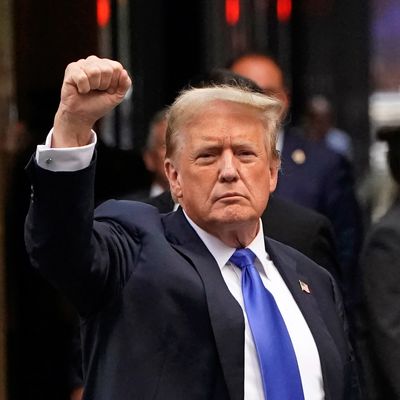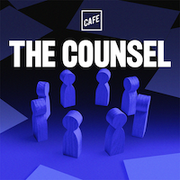

Photo: Timothy A. Clary/AFP via Getty Images
While the entire media and political worlds were focused on the Democratic Party’s historic presidential nomination of Kamala Harris in Chicago last week, we nearly overlooked this great moment in the annals of prosecutorial fortitude: The Manhattan District Attorney’s Office bravely declared that it would “defer to the Court” on whether Donald Trump should be sentenced before the election, or after, or maybe never.
That’s right, folks. Prosecutors — who, by vocational definition, must defer to the judge — announced that they had no view on the matter and would, in fact, defer to the judge. It’s the old “We take no position” cop-out. (I’ll admit I’ve done it myself when convenient a time or two.)
We’re talking here, of course, about Trump’s sentencing following his conviction by a Manhattan jury for 34 counts of falsifying business records relating to 2016 hush money payments to Stormy Daniels. After the jury returned its verdict, Judge Juan Merchan set sentencing for July, following the normal timeline.
But then, almost exactly a month after the verdict came down, the U.S. Supreme Court dropped a whopper of its own in the presidential-immunity ruling. That decision arose from a different case, Jack Smith’s federal prosecution of Trump for 2020 election subversion — but its repercussions hit the Manhattan case first.
How on earth, you might reasonably wonder, could Trump have any kind of presidential immunity when the hush-money payments happened before he became president? The (undeniably obscure) answer is that, while the vast majority of the prosecution’s evidence did focus on Trump’s pre-presidential conduct, certain pieces of the case did relate to his time in office. For example, he spoke with White House communications director Hope Hicks about how to respond publicly to media accounts of the hush-money payments. The DA also introduced testimony from White House aide Madeleine Westerhout about how Trump conducted his daily business — reviewing memos, taking phone calls — in the Oval Office. And prosecutors used evidence of statements made by Trump through official White House communications channels (including Twitter) while he was president.
It’s a thin foothold for the defense, but it’s not nothing, and it’s not utterly ridiculous. And so, just 11 days after the Supreme Court’s ruling dropped, Trump’s lawyers asked Judge Merchan to toss out the conviction. Some of the evidence used at the Manhattan trial should have been barred based on newly announced immunity principles, Trump’s team argued, and therefore the jury’s verdict was tainted and should be vacated.
The DA objected. They argued that the evidence of Trump’s conduct while he was president had nothing to do with his actual presidential duties and therefore is not entitled to immunity. And even if the evidence was improperly admitted, prosecutors claimed, it was what lawyers call “harmless error” — no big deal, essentially, because there was plenty of other evidence to support the conviction, and the tainted evidence was minor anyway. The problem here is that the prosecution boasted to the jury during closing arguments that the Hicks and Westerhout testimony was “utterly devastating” and “critical pieces of the puzzle.”

Listen to The Counsel podcast
Subscribe on:
I’m fairly confident Judge Merchan will side with the DA here and rule against Trump. If so, Trump will get to appeal — on the immunity issue, and others — to the midlevel New York Appellate Division and then, potentially, to New York’s top state court, the Court of Appeals. After that, the U.S. Supreme Court itself might choose to take a look.
The big question, as it is so often when it comes to the Trump prosecutions, is simply: When? More precisely as to the instant dilemma: Should the Judge impose sentence before or after Trump takes up that immunity appeal?
And here’s where the Manhattan DA’s Office took a pass rather than an actual position. Up to you, judge; we don’t care, they told him this week. If Judge Merchan chooses to let Trump appeal the immunity issue first, then we’re looking at months, and maybe more than a year, of delay before sentencing. If not, then sentencing can go forward as soon as September 18, as currently scheduled — just six weeks before Election Day.
This is where politics collide with the criminal-justice process. If Judge Merchan were to sentence Trump to anything short of prison time — probation, fines, and other lightweight penalties — then it’ll be widely seen to lend credence to Trump’s claim that the entire prosecution was a big whoop about nothing.
If, however, the judge does impose a prison sentence, that could directly impact the election. On one hand, a prison sentence would further tarnish Trump in a tangible way. How can we elect a guy who’s not only a convicted felon but is also actually going to prison (though not right away, as the judge almost certainly would let Trump finish his appeals before serving any time)?
On the other hand, a prison sentence would certainly rally (and, let’s be real, enrage) Trump’s core supporters — and, more importantly, perhaps moderate voters who view the Manhattan DA’s case as an unjustified use of prosecutorial power for political means. Even folks who dislike Trump could well be uneasy with him losing his liberty, actually getting thrown in a prison jumper and locked up and separated from his family, for this case. (The January 6 and classified-documents cases are far less likely to move moderates, given the obvious gravity of those charges.)
But now, with Trump’s new request to delay sentencing pending his immunity appeal — and the Manhattan DA’s passive non-position — an off-ramp suddenly opens up before Judge Merchan. He can rule in Trump’s favor, without opposition from the DA, and put off the whole hot mess until after the appeal and, in effect, until way after the election.
I don’t know what Judge Merchan will decide on this timing issue or have much of an inclination either way. But judges are human beings in black robes and, like the rest of us, they’re naturally drawn to paths of least resistance. If Judge Merchan does grant a postponement pending appeal, then Trump won’t face sentencing until (far) after the election — and, if he wins either that election or his appeal, perhaps ever.
This article also appeared in the free CAFE Brief newsletter. You can find more analysis of law and politics from Elie Honig, Preet Bharara, Joyce Vance, and other CAFE contributors at CAFE.com
Source link




